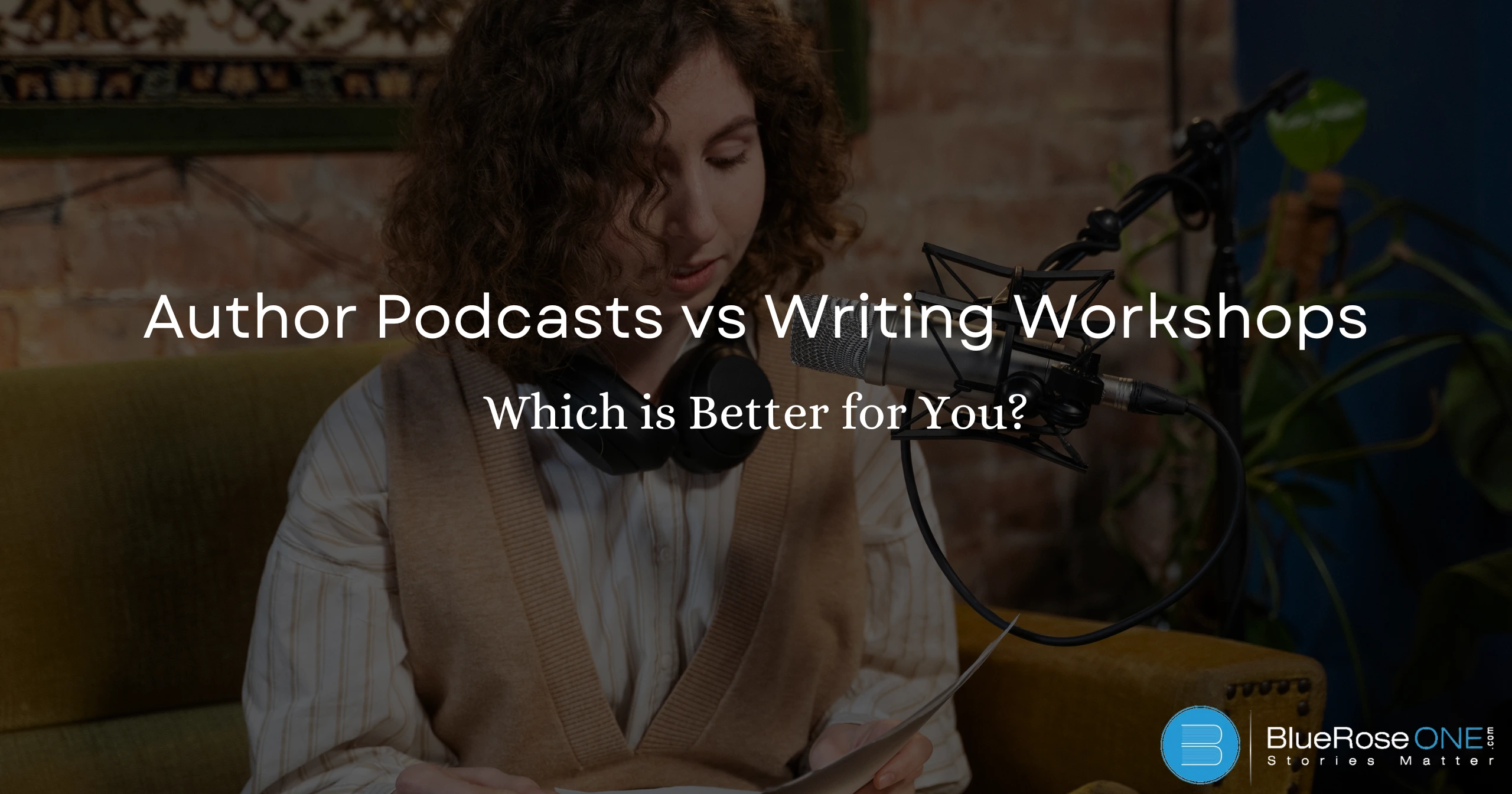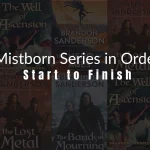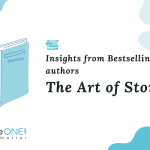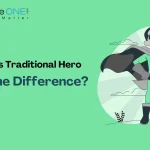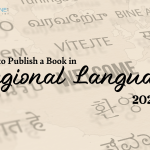Deciding how to improve your writing talents can be like standing at a crossroads. Should you listen to an insightful author podcast or participate in a writing workshop? Each has its own set of perks, but which one is most suited to your needs? Let us break it down.
What Are Author Podcasts?
Author podcasts are audio programs developed by writers for writers and readers to share their perspectives, experiences, and writing and publishing advice. These podcasts frequently include interviews with authors, debates about narrative strategies, and guidance on how to navigate the publishing industry. They are an adaptable, on-the-go resource for learning and inspiration, making them great for busy people. Unlike traditional seminars, author podcasts offer free or low-cost access to useful material while encouraging creativity and boosting writing abilities in a handy manner.
What Are Writing Workshops?
Writing workshops are group gatherings where writers can share, critique, and improve their work. These seminars, sometimes taught by established authors or lecturers, offer a friendly setting for receiving criticism on writing style, structure, and storytelling. They can concentrate on certain genres, techniques, or overall writing abilities. Writers benefit from customized assistance, peer conversations, and expert guidance. Writing seminars, whether in person or online, help authors hone their skill, acquire confidence, and connect with a supportive community.

Benefits of Author Podcasts
Accessibility and Convenience
Author podcasts provide unparalleled accessibility and convenience, making them an invaluable resource for authors with hectic schedules. Unlike writing workshops, which have defined times and locations, podcasts can be accessed at any time and from any location. Whether you’re commuting, exercising, or resting at home, you can watch episodes at your own leisure. Most podcasts are either free or significantly less expensive than workshops, giving them an affordable option to learn from seasoned authors and industry experts without disrupting your regular routine.
Cost-Effectiveness
Author podcasts are a cost-effective approach to study and grow as a writer. Unlike writing seminars, which can charge high registration fees, travel costs, or membership fees, podcasts are usually free or demand a small commitment for premium access. This makes them a viable option for budget-conscious authors. Podcasts allow you to learn from industry experts, hear real-world stories, and get practical advice all without breaking the bank, making them an affordable resource for writers.
Diverse Perspectives and Guests
The range of viewpoints that author podcasts provide is one of their main advantages. Numerous podcasts feature speakers that offer insightful commentary on various facets of writing and the book industry, such as best-selling writers, editors, and publishing experts. You might not come across new methods, genres, and concepts in writing seminars, but these many voices can introduce you to them. You can learn more about storytelling and get new ideas for your own work by hearing about a variety of situations.
Inspiration Through Storytelling
Author podcasts use engrossing narrative to inspire listeners. Authors give readers insightful information by sharing their own experiences, creative processes, and lessons learnt. These tales have the power to rekindle your enthusiasm for writing, inspire you to take on obstacles, and generate fresh ideas. Listening to successful authors’ personal stories fosters a sense of community and inspires aspiring authors to keep going. In contrast to organized courses, podcasts are an accessible and inspiring resource since they let you take in this inspiration at your own speed.

Benefits of Writing Workshops
Hands-On Learning
Personalized Feedback
Networking Opportunities
Structured Environment for Skill Development
Writing workshops provide an organized atmosphere for skill development, which is one of its primary benefits. These workshops provide a focused environment in which authors can learn and develop their skills under expert instruction. Participants receive comments on their work, complete writing activities, and benefit from discussions that stretch their creative thinking. This systematic approach helps authors stay motivated and make consistent progress, making writing workshops a wonderful resource for anyone wishing to improve their writing talents.
Key Differences Between Author Podcasts and Writing Workshops
Format and Delivery
Learning Style Suitability
Level of Interaction
How to Decide Which Is Better for You
Assessing Your Learning Style
Considering Your Budget
Evaluating Your Writing Goals
Consider your writing goals before deciding between author podcasts and writing workshops. Writing workshops offer hands-on feedback, direct engagement with peers, and expert assistance, making them excellent for people looking for individualized input and community support. Workshops can be an effective approach to enhance specific writing skills. Author podcasts, on the other hand, are ideal for flexible learning since they provide ideas from experienced authors while on the go, but they lack personalized feedback.
Combining the Two for Maximum Benefit
Blending Inspiration and Practical Application
Writing workshops provide writers a one-of-a-kind opportunity to learn by combining inspiration and practical practice. Workshops not only inspire by introducing participants to a variety of writing styles and strategies, but also provide practical feedback to help them develop their craft. This hands-on experience enables authors to immediately implement new ideas, which is more difficult to achieve when listening to author podcasts alone. Joining writing workshops provides writers with instant, concrete suggestions that increase their confidence and talents.
Examples of Complementary Use
Combining writing workshops and author podcasts can help you improve your writing skills. For example, you may attend a workshop to receive hands-on feedback and practice, then listen to podcasts to reinforce approaches and generate new ideas. After a session, hearing published authors share their creative processes can motivate you to try new tactics. This strategy enables authors to stay motivated, study at their own speed, and improve abilities learnt in writing workshops by providing continual exposure to industry knowledge.
Popular Author Podcasts Worth Exploring
Top Recommendations
- The Creative Penn: Tips on writing and publishing.
- Writing Excuses: Bite-sized advice for writers.
- Grammar Girl: Quick grammar lessons.
Examples with Brief Descriptions
Top Writing Workshops to Consider
Options for Beginners
For novices looking into writing workshops, it’s critical to find a welcoming environment that promotes skill development and creativity. Many writing seminars target beginner authors by emphasizing fundamental techniques including storytelling, character development, and editing essentials. Look for choices with small class sizes, interactive feedback, and competent instructors. Popular beginner-friendly programs include Gotham Writers Workshop, Writer’s Digest University, and online courses from Coursera and MasterClass. These writing seminars will help you build confidence and develop your writing skills from the bottom up.
Advanced-Level Workshops
Online vs. In-Person Choices
When deciding between online and in-person writing seminars, each offers distinct advantages. Online writing seminars provide flexibility by allowing participants to learn from anywhere, making them great for hectic schedules. However, in-person seminars allow for face-to-face interaction, which promotes direct feedback and a deeper sense of community. In-person meetings may be more appealing to authors looking for a collaborative environment, whilst online choices are more suited to individuals who require flexible scheduling. Ultimately, the decision is based on personal preference, goals, and learning style.
Tips for Making the Most Out of Both
Engaging Actively with Podcasts
Preparing for Writing Workshops
Conclusion
Both author podcasts and writing seminars have their advantages. Podcasts are ideal for on-the-go inspiration, whereas workshops offer a deeper dig into skill development. Why not try both? By mixing these materials, you can build a well-rounded learning experience customized to your needs.
Frequently Asked Questions
Absolutely! They offer a wealth of knowledge without overwhelming you.
Focus on workshops that align with your goals, skill level, and budget.
Yes, most are free on platforms like Spotify and Apple Podcasts.
They provide structured guidance and feedback, which self-study often lacks.
Use podcasts for inspiration and workshops for practical application.

